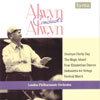Alwyn Orchestral Works
View record and artist detailsRecord and Artist Details
Composer or Director: William Alwyn
Genre:
Orchestral
Label: Lyrita
Magazine Review Date: 12/1992
Media Format: CD or Download
Media Runtime: 59
Mastering:
Stereo
ADD
Catalogue Number: SRCD230

Tracks:
| Composition | Artist Credit |
|---|---|
| Concerto Grosso No. 2 |
William Alwyn, Composer
London Philharmonic Orchestra William Alwyn, Conductor William Alwyn, Composer |
| Autumn Legend |
William Alwyn, Composer
London Philharmonic Orchestra Osian Ellis, Harp William Alwyn, Conductor William Alwyn, Composer |
| Lyra Angelica |
William Alwyn, Composer
Geoffrey Browne, Cor anglais London Philharmonic Orchestra William Alwyn, Composer William Alwyn, Conductor |
Composer or Director: William Alwyn
Genre:
Orchestral
Label: Lyrita
Magazine Review Date: 12/1992
Media Format: CD or Download
Media Runtime: 64
Mastering:
Stereo
ADD
Catalogue Number: SRCD229

Tracks:
| Composition | Artist Credit |
|---|---|
| Derby Day |
William Alwyn, Composer
London Philharmonic Orchestra William Alwyn, Composer William Alwyn, Conductor |
| (The) Magic Island |
William Alwyn, Composer
London Philharmonic Orchestra William Alwyn, Conductor William Alwyn, Composer |
| Sinfonietta for Strings |
William Alwyn, Composer
London Philharmonic Orchestra William Alwyn, Conductor William Alwyn, Composer |
| Festival March |
William Alwyn, Composer
London Philharmonic Orchestra William Alwyn, Conductor William Alwyn, Composer |
| Elizabethan Dances, Movement: 1. Moderato e ritmico |
William Alwyn, Composer
London Philharmonic Orchestra William Alwyn, Conductor William Alwyn, Composer |
| Elizabethan Dances, Movement: 2. Waltz tempo, languidamente |
William Alwyn, Composer
London Philharmonic Orchestra William Alwyn, Conductor William Alwyn, Composer |
| Elizabethan Dances, Movement: 4. Moderato |
William Alwyn, Composer
London Philharmonic Orchestra William Alwyn, Composer William Alwyn, Conductor |
| Elizabethan Dances, Movement: 5. Poco allegretto e semplice |
William Alwyn, Composer
London Philharmonic Orchestra William Alwyn, Composer William Alwyn, Conductor |
Author: Edward Greenfield
In Autumn Legend Nicholas Daniel is a warmer more expressive soloist than Geoffrey Browne on the Lyrita issue, and in both works Hickox makes the music flow a little faster and more freely. That makes a significant difference in Lyra Angelica, where Alwyn's scheme involves a sequence of four elegiac, predominantly slow movements, illustrating quotations from the epic poem,
Not that Alwyn's own reading is in any way slack, and Osian Ellis on the harp is second to none. The coupling could well be allowed to dictate preference, with the Concerto Grosso No. 2 of 1948 a splendid piece, with a sensuously beautiful slow movement and with echoes of Elgar's and Vaughan Williams's string masterpieces in its contrasting of string quartet with the full string band.
Alwyn's other disc collecting four shorter works and the strong, toughly argued Sinfonietta for strings of 1970 brings two more duplications with Hickox. Again the wide-ranging Chandos recording brings obvious advantages, both in the evocative tone-poem The Magic Island, inspired by Shakespeare's The Tempest, and in the boisterous but finely-controlled overture, Derby day. It is remarkable both how skilfully the composer conceals evidence of the 12-note techniques that he claims to use here, and for its restraint. Inspired by Frith's celebrated painting, this is a colour piece which is the more effective for using the orchestra with utmost delicacy, reserving its most rumbustious outburst for the end.
It is a pity that Alwyn recorded only four of his Elizabethan Dances, Nos. 1, 2, 4 and 5 of the original sequence of six, but they are most effective colour pieces, Nos. 1 and 5 with Elizabethean echoes from history Nos. 2 and 4 with overtones of the modern Ellzabethan age. The Festival March was written in 1950 for the Festival of Britain of the following year, very much in the mould of Elgar's and Walton's marches and echoing Alwyn's bold and colourful film-music. The big melody may not match those of Elgar and Walton in memorability, but this is a piece that deserves to be used as an alternative, strongly conducted by the composer.
Much the biggest work on the second disc is the Sinfonietta of 1970, not just longer (26 minutes), but tougher in the outer movements, with echoes of Bartok's
There and throughout both these discs Alwyn's technical mastery and his ability to conceal ingenuity make for consistently strong, immediate music-making. It is most welcome to have his own interpretations restored to the catalogue, with the CD transfers offering bright, full, well-balanced sound, only slightly edgy on high strings.'
Discover the world's largest classical music catalogue with Presto Music.

Gramophone Digital Club
- Digital Edition
- Digital Archive
- Reviews Database
- Full website access
From £8.75 / month
Subscribe
Gramophone Full Club
- Print Edition
- Digital Edition
- Digital Archive
- Reviews Database
- Full website access
From £11.00 / month
Subscribe
If you are a library, university or other organisation that would be interested in an institutional subscription to Gramophone please click here for further information.





